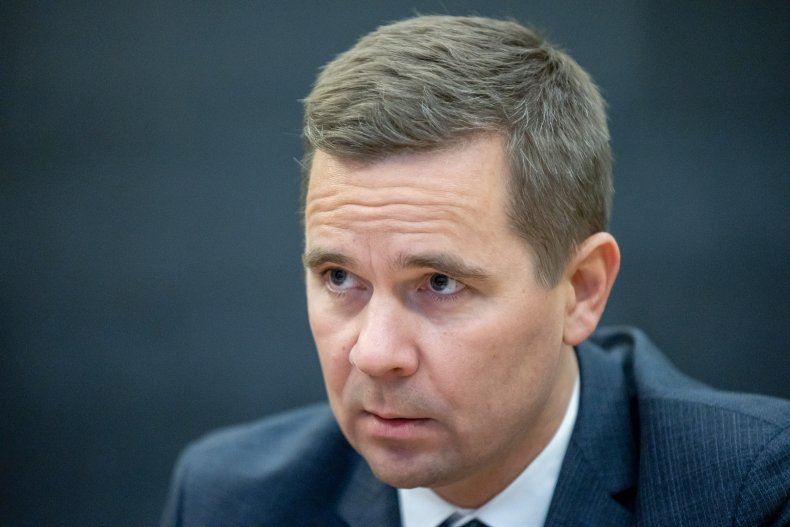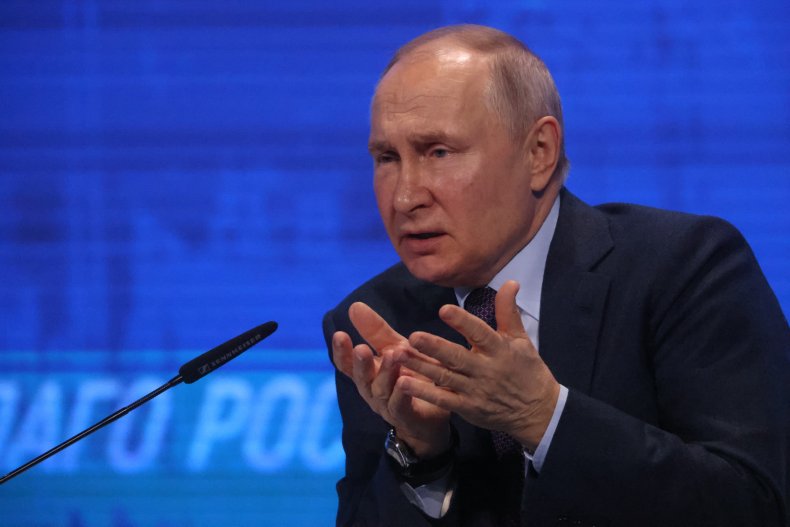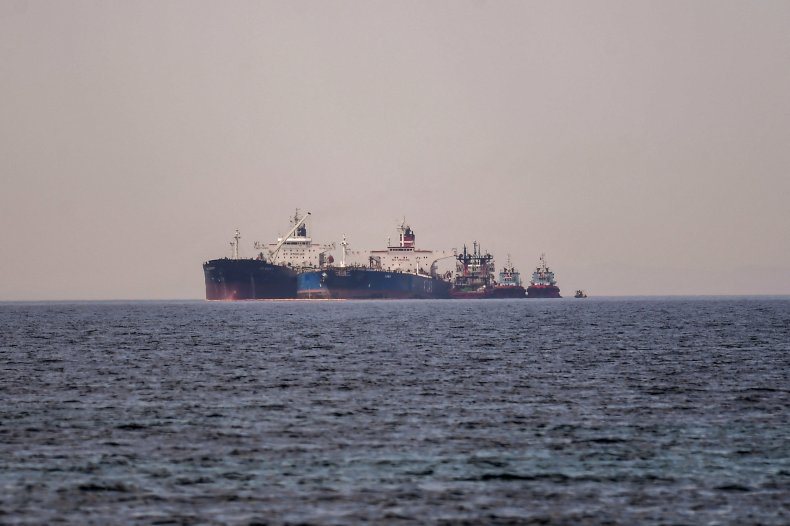- Russia is feeling the pressure of sanctions and a $60 per barrel seaborne crude oil export price cap set by the European Union and the G7.
- Estonia’s former foreign intelligence chief, Mikk Marran, told Newsweek that more sanctions and a lower cap on oil exports should be implemented to apply more pressure on the Kremlin.
- Recent reports indicate the G7 is not sold on the idea of reducing the price cap further.
Western nations and their G7 partners should intensify their attacks on Russia’s lucrative fossil fuel export revenues and throttle Moscow’s ability to fund its ongoing war in Ukraine, a former intelligence chief has said.
Mikk Marran, who from January 2016 until October 2022 headed Estonia’s Foreign Intelligence Service, told Newsweek that more sanctions and a lower cap on Russian crude oil exports were needed to apply more pressure on the Kremlin.
“We should initiate more sanctions, we should lower the oil price cap,” Marran said. “We should put more sanctions on the top banks in Russia, because there are still powerful banks that have not been sanctioned by the West, for example, Gazprombank, one of the major banks in Russia.”
“The West has done quite well when assisting Ukrainian army and the Ukrainian state, but we could do more as a collective West to pressure more the Russian finances,” Marran said. Western allies, he added, “are getting there, they are almost there” in establishing a more hardline approach to Moscow.

Estonian State Forest Management Centre
“Estonia and other Baltic countries and Poland, we still have to share more information. But we know that also the larger intelligence institutions in the West are collecting more and more on Russia, so they’re getting better and better. And they are also forwarding that information to their political leadership.”
Putin’s Price Pressure
The joint European Union-G7 measure set a maximum purchase price of $60 per barrel for seaborne Russian crude oil, the December introduction of which coincided with an EU and U.K. ban on seaborne Russian crude oil imports. This was followed by subsequent EU-G7 price caps on other refined petroleum products in February.
The crude price cap is to be reviewed at regular interviews, and G7 nations are due to meet this month to discuss cutting the maximum price further. The Wall Street Journal reported this week that the G7 does not wish to reduce the cap, despite several European nations advocating for a lower price.
“It’s a good development that the oil price cap has been set, but $60 per barrel is actually too high,” Marran—now the CEO of the Estonian State Forestry Management Centre—said. “We should push that lower because Russia has no new capability to limit the production. Russia has no capability to stop oil production. They can’t stop the oil drilling facilities because they don’t have that technology.”
Marran was referring to the difficulties in restricting or even halting oil production at wells, which can force a so-called “shut-in.” Such a move might be beneficial for a producer as it cuts the overall supply and drives up the price, but the long-term implications are significant.
In summer of 2022, Putin said he would not order the closure of Russian wells. “As far as refusal from our energy resources is concerned, this is unlikely for the next few years, while it’s not clear, what will happen during those few years,” the president said. “That’s why no one will pour cement into the wells.”

Contributor/Getty Images
Soon after, Julianne Geiger, a researcher for Oilprice.com, wrote that “when Russian wells are idled for a lengthy period of time, it can lead to permanent shut-ins, with operational challenges proving insurmountable in some of their maturing fields.” Geiger also noted that as Russia’s benchmark Urals crude blend is made up of oil from multiple fields, its quality might be altered and price reduced if some Russian wells are closed.
Craig Kennedy, a Harvard expert on Russia’s oil industry, wrote in April 2022 that a large-scale reduction in Russian oil production would do “severe damage […] to Russia’s upstream production capacity. It could render tens of thousands of marginal wells uneconomic and compromise complex pressure management systems at the field level.”
“This risk is well appreciated by Russian reservoir engineers, but less evident to Western policy makers,” Kennedy wrote. “Additionally, this could also deeply undermine political support for the Putin regime in Russia’s oil producing regions.”
Russia’s Economy
Kyiv has been pushing for a cut in the oil price cap, along with some of the EU’s most Russo-skeptic nations like the Baltic states. Oleg Ustenko, an economic adviser to President Volodymyr Zelensky told Newsweek that reducing the cap is a top priority.
“I do believe that we have to go further, and we have to squeeze this price cap to the lowest possible level,” Ustenko said from Kyiv. “We have to make sure that the Russians do not have cash on hand in order to finance their military machine.”
Ustenko suggested a price cap of $10 to $20 per barrel, which is lower than Zelensky’s proposed cap of $30 to $40 per barrel. Advocates of a lower price cap have noted that Russia kept selling during the COVID-19 slump that saw Urals crude drop to $16.6 per barrel in April 2020, arguing this shows Moscow can be forced much lower.
It is “absolutely correct” to say that Russia will struggle to stop operations at certain oil drilling sites, Ustenko said. “They are not able to close some of their fields temporarily…I would not say that of all of them, but many of them.”
Recent economic indicators suggest the Russian economy, which at times has appeared more sanctions-resilient than hoped for, is struggling to maintain its lucrative fuel exports.
The International Energy Agency said on Wednesday that Russia’s estimated oil export revenues fell to $11.6 billion in February, down $2.7 billion from January when significantly more oil was exported.
Russia’s budget deficit is also widening amid higher military spending and falling fossil fuel revenues, the shortfall reaching over $34 billion as of early March. The Finance Ministry reported oil and gas revenues 46.4 percent lower—at around $12 billion—in January and February versus the same period in 2022.

ANGELOS TZORTZINIS/AFP via Getty Images
In a statement, Kremlin spokesman Dmitry Peskov told Newsweek: “The assertions of Estonian foreign intelligence can hardly be called professional. Most of them are simply wrong. Such a biased position, which is based on erroneous assertions, in many ways contributes to total Russophobia in Estonia and other Baltic states.”
“The statement that the economy is doing badly is erroneous,” Peskov added. “The economy is stable and the unprecedented sanctions not only failed to undermine it, but also did not cause a significant drop, which slightly exceeded 2 percent last year. And this year, the economy has already entered the trajectory of growth. Macroeconomic stability is 100 percent.”
“The banking system is also completely stable. Demand for Russian energy resources is growing. The Russian Federation is confident in its intention not to recognize any price ceiling and will not sell resources to countries that recognize those price caps.”